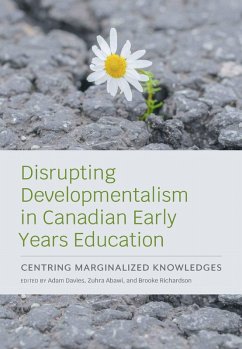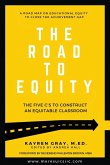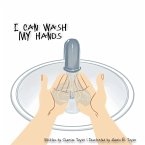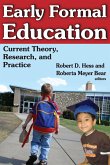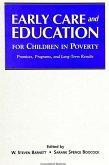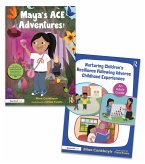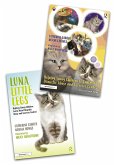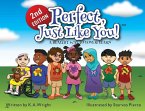Disrupting Developmentalism in Canadian Early Years Education
Centring Marginalized Knowledges
Herausgeber: Davies, Adam; Abawi, Zuhra; Richardson, Brooke
Disrupting Developmentalism in Canadian Early Years Education
Centring Marginalized Knowledges
Herausgeber: Davies, Adam; Abawi, Zuhra; Richardson, Brooke
- Broschiertes Buch
- Merkliste
- Auf die Merkliste
- Bewerten Bewerten
- Teilen
- Produkt teilen
- Produkterinnerung
- Produkterinnerung
Disrupting Developmentalism in Canadian Early Years Education challenges dominant discourses about children and childhood by centring marginalized and subjugated voices, experiences, and knowledges. Confronting systemic white supremacy, cis-heteronormativity, ableism, and sanism rooted in developmental psychology, the authors invite educators to imagine new possibilities for understanding children, childhood, and education. The collection explores critical activist knowledges for disrupting developmentalism through contributions from teachers, practitioners, and educators, including narratives…mehr
Andere Kunden interessierten sich auch für
![The Road To Equity The Road To Equity]() Kayren GrayThe Road To Equity24,99 €
Kayren GrayThe Road To Equity24,99 €![I Can Wash My Hands I Can Wash My Hands]() Chemise TaylorI Can Wash My Hands11,99 €
Chemise TaylorI Can Wash My Hands11,99 €![Early Formal Education Early Formal Education]() Robert HessEarly Formal Education57,99 €
Robert HessEarly Formal Education57,99 €![Early Care and Education for Children in Poverty Early Care and Education for Children in Poverty]() Early Care and Education for Children in Poverty35,99 €
Early Care and Education for Children in Poverty35,99 €![Helping Children to Thrive Following Adverse Childhood Experiences Helping Children to Thrive Following Adverse Childhood Experiences]() Mine ConkbayirHelping Children to Thrive Following Adverse Childhood Experiences48,99 €
Mine ConkbayirHelping Children to Thrive Following Adverse Childhood Experiences48,99 €![Helping Young Children to Understand Domestic Abuse and Coercive Control Helping Young Children to Understand Domestic Abuse and Coercive Control]() Catherine LawlerHelping Young Children to Understand Domestic Abuse and Coercive Control40,99 €
Catherine LawlerHelping Young Children to Understand Domestic Abuse and Coercive Control40,99 €![Perfect, Just Like You! Perfect, Just Like You!]() K A WrightPerfect, Just Like You!24,99 €
K A WrightPerfect, Just Like You!24,99 €-
-
-
Disrupting Developmentalism in Canadian Early Years Education challenges dominant discourses about children and childhood by centring marginalized and subjugated voices, experiences, and knowledges. Confronting systemic white supremacy, cis-heteronormativity, ableism, and sanism rooted in developmental psychology, the authors invite educators to imagine new possibilities for understanding children, childhood, and education. The collection explores critical activist knowledges for disrupting developmentalism through contributions from teachers, practitioners, and educators, including narratives and lived experiences. This text will be an invaluable resource for early childhood education, teacher education, and child and youth studies programs in Canadian colleges and universities with courses focusing on child development, equity, diversity, inclusion, critical perspectives and/or contemporary issues in early childhood education.
Produktdetails
- Produktdetails
- Verlag: Canadian Scholars
- Seitenzahl: 362
- Erscheinungstermin: 3. Dezember 2025
- Englisch
- Abmessung: 248mm x 171mm
- ISBN-13: 9781773385075
- ISBN-10: 1773385070
- Artikelnr.: 75250511
- Herstellerkennzeichnung
- Libri GmbH
- Europaallee 1
- 36244 Bad Hersfeld
- gpsr@libri.de
- Verlag: Canadian Scholars
- Seitenzahl: 362
- Erscheinungstermin: 3. Dezember 2025
- Englisch
- Abmessung: 248mm x 171mm
- ISBN-13: 9781773385075
- ISBN-10: 1773385070
- Artikelnr.: 75250511
- Herstellerkennzeichnung
- Libri GmbH
- Europaallee 1
- 36244 Bad Hersfeld
- gpsr@libri.de
Adam Davies (they/them/he/him/all) is a tenured associate professor in the School of Fine Arts and Music, College of Arts, University of Guelph and is a registered early childhood educator and Ontario certified teacher. Adam's work investigates issues pertaining to social justice and equity in early childhood education, K–12 schooling, and higher education. Adam is a queer, neurodivergent, and Mad(dened) activist, scholar, and teacher/educator/practitioner. Adam holds a PhD in curriculum studies and teacher development with collaborative specializations in women and gender studies and sexual diversity studies from the Ontario Institute for Studies in Education, University of Toronto. Adam recently co-edited the text Queering Professionalism: Pitfalls and Possibilities with Cameron Greensmith (University of Toronto Press). Zuhra Abawi is an assistant professor of education at Niagara University and Chair of the Master of Educational Leadership program. Prior to her faculty appointment, she was an elementary teacher and early childhood educator. She holds a doctorate in social justice education from the University of Toronto. Her teaching experience spans K–12 to higher education. She is the author of The Effectiveness of Educational Policy for Bias-Free Hiring: Critical Insights to Enhance Diversity in the Canadian Teacher Workforce (2021) and co-editor of Equity as Praxis in Early Childhood Education and Care (2021) and Enacting Anti-Racist and Activist Pedagogies in Education: Canadian Perspectives (2023) and Activist Leadership for Inclusive Schools: Canadian Perspectives (2025). Her work focuses on how discourses of race, equity, and identity are negotiated, mediated, and socialized in education. Brooke Richardson (she/her) is a care activist, scholar, and mother motivated by the belief that good care is foundational to meaningful lives and a democratic society. Brooke is an assistant professor in child and youth studies at Mount Saint Vincent University in Halifax, Canada. Her research and scholarly work focus on disrupting increasingly privatized "care" systems (child care and child protection) and working toward societies that uphold the integrity of all those involved (children, mothers, educators, social workers). Brooke published two co-edited anthologies in 2022: Feminisms and the Early Childhood Educator: Critical Conversations (Bloomsbury, with Rachel Langford) and Mothering on the Edge: A Critical Examination of Mothering within Child Protection Systems (Demeter Press).
Foreword
Introduction: Disrupting Developmentalism to Create Space for New Knowings
and Becomings in Early Childhood Education
Chapter 1: Struggling with the Work of the Pedagogist in Canada:
Subtracting Early Childhood Education from Child Development
Chapter 2: In the Threshold of a Cruel and Humble Optimism—Contesting
Developmentalism Through Critical Disability Studies
Chapter 3: (Re)Imagining Human Development: Opening Decolonizing
Possibilities Through a Post-Secondary Educational Psychology Course
Chapter 4: "Every Child Matters": Canadian Pre-Service Teachers' Critical
Engagement with Indigenous Life-Narrative Picture books
Chapter 5: Honouring the Learning Spirit of Indigenous Children in Early
Education
Chapter 6: Decolonizing a Linear Conception of Teacher Education:
Disrupting Developmental Paradigms Through an Ethics of Care
Chapter 7: Re-storying of an Immigrant Child in Canada: Exploring
Pedagogical Criticalities in Problematizing the Dominant Clinical
Discourses
Chapter 8: Disrupting Developmentalism through Queer Theory in
Post-Secondary Early Childhood Education: A Document Analysis
Chapter 9: "So That's When I Started to Feel the Passion in My Heart Start
to Evolve": Being Cared About and Caring For Pedagogy Through a Feminist
Care Ethics
Chapter 10: Objections to Objective List Theories and Development As
Well-being
Chapter 11: Decolonizing our Understanding of Indigenous Children and
Learning
Chapter 12: Is Psychoanalysis Developmentalism? Some Thoughts on Encounters
with Psychoanalytic Theory
Chapter 13: Toward an Ex-Colonial Childhood: Collective Exits from
Colonialisms in Mi'kmaw Literatures
Chapter 14: Deconstruction of the "At-Risk" Designation: Synthesis of a
Critical Discourse Analysis
Chapter 15: Decolonizing Canadian Elementary Teacher Education:
Connection-Based Learning, Critical Reflexivity, and Social Justice
Chapter 16: From Parenting "Expert" to Parenting Ally: Re-examining the
Role of the Early Childhood Educator Through a Family-Centred Framework
Chapter 17: Disrupting Developmentalism by Cultivating Wisdom
Chapter 18: Troubling Educators' Humanist Assumptions: Possible
(Re)configurations of Authority Through the Intra-Actions of Children and
Classroom Chairs
Conclusion: "Develop Me!"—A Contrarian Poem for Non-Developmental
Futurities in Early Childhood Education and Beyond
Contributor Biographies
Introduction: Disrupting Developmentalism to Create Space for New Knowings
and Becomings in Early Childhood Education
Chapter 1: Struggling with the Work of the Pedagogist in Canada:
Subtracting Early Childhood Education from Child Development
Chapter 2: In the Threshold of a Cruel and Humble Optimism—Contesting
Developmentalism Through Critical Disability Studies
Chapter 3: (Re)Imagining Human Development: Opening Decolonizing
Possibilities Through a Post-Secondary Educational Psychology Course
Chapter 4: "Every Child Matters": Canadian Pre-Service Teachers' Critical
Engagement with Indigenous Life-Narrative Picture books
Chapter 5: Honouring the Learning Spirit of Indigenous Children in Early
Education
Chapter 6: Decolonizing a Linear Conception of Teacher Education:
Disrupting Developmental Paradigms Through an Ethics of Care
Chapter 7: Re-storying of an Immigrant Child in Canada: Exploring
Pedagogical Criticalities in Problematizing the Dominant Clinical
Discourses
Chapter 8: Disrupting Developmentalism through Queer Theory in
Post-Secondary Early Childhood Education: A Document Analysis
Chapter 9: "So That's When I Started to Feel the Passion in My Heart Start
to Evolve": Being Cared About and Caring For Pedagogy Through a Feminist
Care Ethics
Chapter 10: Objections to Objective List Theories and Development As
Well-being
Chapter 11: Decolonizing our Understanding of Indigenous Children and
Learning
Chapter 12: Is Psychoanalysis Developmentalism? Some Thoughts on Encounters
with Psychoanalytic Theory
Chapter 13: Toward an Ex-Colonial Childhood: Collective Exits from
Colonialisms in Mi'kmaw Literatures
Chapter 14: Deconstruction of the "At-Risk" Designation: Synthesis of a
Critical Discourse Analysis
Chapter 15: Decolonizing Canadian Elementary Teacher Education:
Connection-Based Learning, Critical Reflexivity, and Social Justice
Chapter 16: From Parenting "Expert" to Parenting Ally: Re-examining the
Role of the Early Childhood Educator Through a Family-Centred Framework
Chapter 17: Disrupting Developmentalism by Cultivating Wisdom
Chapter 18: Troubling Educators' Humanist Assumptions: Possible
(Re)configurations of Authority Through the Intra-Actions of Children and
Classroom Chairs
Conclusion: "Develop Me!"—A Contrarian Poem for Non-Developmental
Futurities in Early Childhood Education and Beyond
Contributor Biographies
Foreword
Introduction: Disrupting Developmentalism to Create Space for New Knowings
and Becomings in Early Childhood Education
Chapter 1: Struggling with the Work of the Pedagogist in Canada:
Subtracting Early Childhood Education from Child Development
Chapter 2: In the Threshold of a Cruel and Humble Optimism—Contesting
Developmentalism Through Critical Disability Studies
Chapter 3: (Re)Imagining Human Development: Opening Decolonizing
Possibilities Through a Post-Secondary Educational Psychology Course
Chapter 4: "Every Child Matters": Canadian Pre-Service Teachers' Critical
Engagement with Indigenous Life-Narrative Picture books
Chapter 5: Honouring the Learning Spirit of Indigenous Children in Early
Education
Chapter 6: Decolonizing a Linear Conception of Teacher Education:
Disrupting Developmental Paradigms Through an Ethics of Care
Chapter 7: Re-storying of an Immigrant Child in Canada: Exploring
Pedagogical Criticalities in Problematizing the Dominant Clinical
Discourses
Chapter 8: Disrupting Developmentalism through Queer Theory in
Post-Secondary Early Childhood Education: A Document Analysis
Chapter 9: "So That's When I Started to Feel the Passion in My Heart Start
to Evolve": Being Cared About and Caring For Pedagogy Through a Feminist
Care Ethics
Chapter 10: Objections to Objective List Theories and Development As
Well-being
Chapter 11: Decolonizing our Understanding of Indigenous Children and
Learning
Chapter 12: Is Psychoanalysis Developmentalism? Some Thoughts on Encounters
with Psychoanalytic Theory
Chapter 13: Toward an Ex-Colonial Childhood: Collective Exits from
Colonialisms in Mi'kmaw Literatures
Chapter 14: Deconstruction of the "At-Risk" Designation: Synthesis of a
Critical Discourse Analysis
Chapter 15: Decolonizing Canadian Elementary Teacher Education:
Connection-Based Learning, Critical Reflexivity, and Social Justice
Chapter 16: From Parenting "Expert" to Parenting Ally: Re-examining the
Role of the Early Childhood Educator Through a Family-Centred Framework
Chapter 17: Disrupting Developmentalism by Cultivating Wisdom
Chapter 18: Troubling Educators' Humanist Assumptions: Possible
(Re)configurations of Authority Through the Intra-Actions of Children and
Classroom Chairs
Conclusion: "Develop Me!"—A Contrarian Poem for Non-Developmental
Futurities in Early Childhood Education and Beyond
Contributor Biographies
Introduction: Disrupting Developmentalism to Create Space for New Knowings
and Becomings in Early Childhood Education
Chapter 1: Struggling with the Work of the Pedagogist in Canada:
Subtracting Early Childhood Education from Child Development
Chapter 2: In the Threshold of a Cruel and Humble Optimism—Contesting
Developmentalism Through Critical Disability Studies
Chapter 3: (Re)Imagining Human Development: Opening Decolonizing
Possibilities Through a Post-Secondary Educational Psychology Course
Chapter 4: "Every Child Matters": Canadian Pre-Service Teachers' Critical
Engagement with Indigenous Life-Narrative Picture books
Chapter 5: Honouring the Learning Spirit of Indigenous Children in Early
Education
Chapter 6: Decolonizing a Linear Conception of Teacher Education:
Disrupting Developmental Paradigms Through an Ethics of Care
Chapter 7: Re-storying of an Immigrant Child in Canada: Exploring
Pedagogical Criticalities in Problematizing the Dominant Clinical
Discourses
Chapter 8: Disrupting Developmentalism through Queer Theory in
Post-Secondary Early Childhood Education: A Document Analysis
Chapter 9: "So That's When I Started to Feel the Passion in My Heart Start
to Evolve": Being Cared About and Caring For Pedagogy Through a Feminist
Care Ethics
Chapter 10: Objections to Objective List Theories and Development As
Well-being
Chapter 11: Decolonizing our Understanding of Indigenous Children and
Learning
Chapter 12: Is Psychoanalysis Developmentalism? Some Thoughts on Encounters
with Psychoanalytic Theory
Chapter 13: Toward an Ex-Colonial Childhood: Collective Exits from
Colonialisms in Mi'kmaw Literatures
Chapter 14: Deconstruction of the "At-Risk" Designation: Synthesis of a
Critical Discourse Analysis
Chapter 15: Decolonizing Canadian Elementary Teacher Education:
Connection-Based Learning, Critical Reflexivity, and Social Justice
Chapter 16: From Parenting "Expert" to Parenting Ally: Re-examining the
Role of the Early Childhood Educator Through a Family-Centred Framework
Chapter 17: Disrupting Developmentalism by Cultivating Wisdom
Chapter 18: Troubling Educators' Humanist Assumptions: Possible
(Re)configurations of Authority Through the Intra-Actions of Children and
Classroom Chairs
Conclusion: "Develop Me!"—A Contrarian Poem for Non-Developmental
Futurities in Early Childhood Education and Beyond
Contributor Biographies

